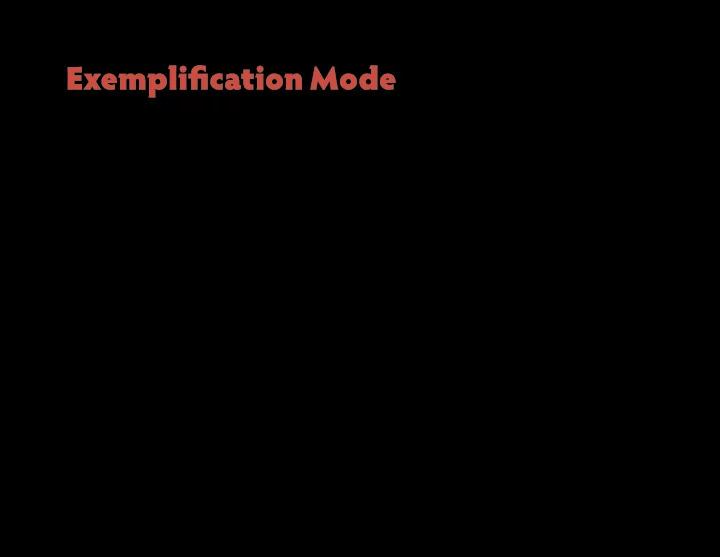

Exemplifj cation Mode rev ised : 06.22.15 || English 1301: Com position I || D. Glen Sm ith, instructor
Exem plifi cations=Exam ple=Illustration Exem plifi cation writing occurs when the writer supplies different exam ples to defend the topic sentence. These types of exemplifi cations: • can exist as individual sentences, full paragraphs, or in full essay format • help clarify your opinion and strengthens your main topic • prove that your opinion contains valid arguments rev ised : 06.22.15 || English 1301: Com position I || D. Glen Sm ith, instructor 2
Three Approaches to Avoid 1. avoid generalities imprecise or vague statements, casual observations: A m an had trouble lifting a box from his car. —be specifi c: Joe, a young m an out of shape, struggled to lift the w ooden crate out of his 1980’s Ford Mustang. 2. avoid fi ctional creations, or fake details all statistical evidence must be backed up by an authority or expert and will be cited from valid resource 3. avoid heavy, abstracted ideas: am biguous> The fall day had great beauty despite the dreariness. be concrete> Damp red and yellow leaves gleamed through a gray mist. rev ised : 06.22.15 || English 1301: Com position I || D. Glen Sm ith, instructor 3
Exem plifi cation Functions • persuade/ confi rm / infl uence : these help convince to the opposition your view and opinions demonstrate validity; these affi rm ideas for those in agreement with you; infl uence neutral parties • speculate : show possible actions or reactions to a given situation • explain diffi cult ideas: discuss types of elements related to one subject • prevent m iscom m unication : prevent possible misinterpretation • clarify/ defend topic sentence • back up com m ents : every idea presented must be defended with an example and/ or a quotation from an authoritative reference rev ised : 06.22.15 || English 1301: Com position I || D. Glen Sm ith, instructor 4
Objective or Subjective Like the Description pattern, Exem plifi cation writing can be subjective or objective by tone or word choice. ( see d em o for Descrip tion Mod e ) Rem em ber: • When constructing your basic ideas, the more details you provide regarding an observation, the stronger your defense becomes. (This builds strong Logos.) • When defending your observations the more details you provide about a critic, the stronger your example becomes. (This build strong Ethos.) Again, be certain you know if your audience is: • against your idea • agrees with your idea • neutral to your idea > such knowledge controls the type of tone and subject within the project rev ised : 06.22.15 || English 1301: Com position I || D. Glen Sm ith, instructor 5
What to Use • personal experience examples < inform al essays only • public opinions and editorials; som e blogs, if from authoritative fi gure • memoirs, other people’s experiences • quotes in interviews, printed material • credible facts found in research (statistics, dates, general information) • established scientifi c theories • hypothetical examples can be used with target words : Suppose we colonize the moon with convicted criminals— Let’s assum e long distance space fl ight will be achieved within our lifetime— • Use several examples throughout the paper— do not rely on just one to make your point. rev ised : 06.22.15 || English 1301: Com position I || D. Glen Sm ith, instructor 6
How to Use • Be sure the information is relevant and does not contradict your opinion • Make sure your information is accurate and up-to-date ; information should not be older than fi ve years old • Use examples which are representative of your topic; do not stray into other side issues • Develop your examples with parallelism and extensive details; be specifi c and thorough rev ised : 06.22.15 || English 1301: Com position I || D. Glen Sm ith, instructor 7
Organization These m ethods are sim ilar to the Description Pattern’s organization strategies— • chronological —linear time line; historical records • em phatic — minor, mundane examples leading to most extreme; building a strategic cover letter for an application • com plexity —moving from basic ideas to increasing complex theories; explaining basic philosophical concepts from simplest to most intricate rev ised : 06.22.15 || English 1301: Com position I || D. Glen Sm ith, instructor 8
Recommend
More recommend